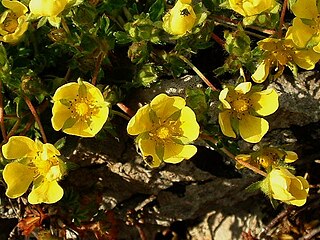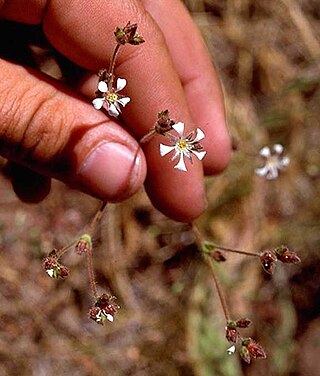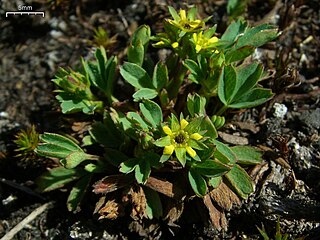
The rose subfamily Rosoideae consists of more than 850 species, including many shrubs, perennial herbs, and fruit plants such as strawberries and brambles. Only a few are annual herbs.

Potentilla is a genus containing over 500 species of annual, biennial and perennial herbaceous flowering plants in the rose family, Rosaceae.

Potentilla erecta is a herbaceous perennial plant belonging to the rose family (Rosaceae).

Dasiphora fruticosa is a species of hardy deciduous flowering shrub in the family Rosaceae, native to the cool temperate and subarctic regions of the northern hemisphere, often growing at high altitudes in mountains. Dasiphora fruticosa is still widely referenced in the horticultural literature under its synonym Potentilla fruticosa. Common names include shrubby cinquefoil, golden hardhack, bush cinquefoil, shrubby five-finger, widdy, kuril tea and tundra rose.
There are over 190 vascular plant species on the Norwegian Arctic archipelago of Svalbard. This figure does not include algae, mosses, and lichens, which are non-vascular plants. For an island so far north, this number of species constitutes an astonishing variety of plant life. Because of the harsh climate and the short growing season, all the plants are slow growing. They seldom grow higher than 10 cm (4 in)

Dasiphora is a genus of shrubs in the rose family Rosaceae, native to Asia, with one species D. fruticosa, ranging across the entire cool temperate Northern Hemisphere. In the past, the genus was normally included in Potentilla as Potentilla sect. Rhopalostylae, but genetic evidence has shown it to be distinct.

Argentina (silverweeds) is a genus of plants in the rose family (Rosaceae) which is accepted by some authors, as containing 64 species, but classified in Potentilla sect. Leptostylae by others.

Potentilla indica, known commonly as mock strawberry, Indian-strawberry, or snakeberry in North America, is a flowering plant in the family Rosaceae. It has ternate foliage and an aggregate accessory fruit, similar to the true strawberries of the Fragaria genus. Unlike the white or slightly pink flowers of true strawberries, Potentilla indica has yellow flowers, as do many other Potentilla species. It is native to eastern and southern Asia, but has naturalized in many regions worldwide.

Potentilla pusilla, the spring cinquefoil or spotted cinquefoil, is a perennial species of flowering plant in the rose family (Rosaceae). It may grow up to the height of 5–15 cm.

Potentilla jaegeri, also known as Jaeger's mousetail and Jaeger's ivesia, is an uncommon species of flowering plant in the rose family.

Potentilla pickeringii, also known as silky mousetail and Pickering's ivesia, is an uncommon species of flowering plant in the rose family. It is endemic to the Klamath Mountains of northern California where it is a plant of mountain meadows, often on serpentine soils.

Potentilla hispidula, commonly known as White Mountains horkelia, is a species of flowering plant in the rose family. It is endemic to the White Mountains, a small range of mountains that straddles the border between California and Nevada east of the Sierra Nevada. It is a resident of dry scrub and alpine and subalpine forest habitat.

Potentilla incana is a plant species in the genus Potentilla. It is native to Europe, with a range stretching from France to Russia.

Sibbaldia is a genus of flowering plants of the family Rosaceae, with a circumpolar distribution, including the high Arctic. The type species is Sibbaldia procumbens. It is also in the Rosoideae subfamily.

Potentilla supina is a species of flowering plant belonging to the family Rosaceae.

Potentilla intermedia is a species of flowering plant belonging to the family Rosaceae.

Potentilla inclinata is a species of flowering plant belonging to the family Rosaceae.

Potentilla aurea, the golden cinquefoil, is a species of flowering plant in the family Rosaceae. It is native to the mountains of mainland Europe, and has been introduced to Turkey. A number of cultivars are available, including 'Aurantiaca', 'Goldklumpen', and 'Plena'.

Dasiphora fruticosa var. veitchii is a flowering plant in the family Rosaceae, native to Sichuan and Yunnan in China. It was first described as the species Potentilla veitchii by Ernest Henry Wilson in 1911, after he had earlier introduced it into gardens in the United Kingdom. Its scientific name and status have varied, and remained "unresolved" according to the Royal Horticultural Society as of May 2022. In horticulture, it may also be found under the names Potentilla davurica var. veitchii and Potentilla fruticosa var. veitchii. It is cultivated as an ornamental flowering shrub.

















